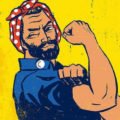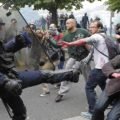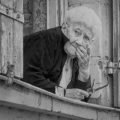 “Will you stop that!” Ammu said, so loudly that Murlidharan, who had hopped off the milestone to stare into the Plymouth, backed off, his stumps jerking in alarm.
“Will you stop that!” Ammu said, so loudly that Murlidharan, who had hopped off the milestone to stare into the Plymouth, backed off, his stumps jerking in alarm.
“What?” Rahel said, but knew immediately what. Her spit bubble.
“Sorry, Ammu,” Rahel said.
“Sorry doesn’t make a dead man alive,” Estha said.
“Oh come on!” Chacko said. “You can’t dictate what she does with her own spit!”
“Mind your own business,” Ammu snapped.
“It brings back Memories,” Estha, in his wisdom, explained to Chacko.
Rahel put on her sunglasses. The World became angry-colored.
“Take off those ridiculous glasses!” Ammu said.
Rahel took off her ridiculous glasses.
“It’s fascist, the way you deal with them,” Chacko said. “Even children have some rights, for God’s sake!”
“Don’t use the name of the Lord in vain,” Baby Kochamma said.
“I’m not,” Chacko said. “I’m using it for a very good reason.”
“Stop posing as the children’s Great Savior!” Ammu said. “When it comes down to brass tacks, you don’t give a damn about them. Or me.”
“Should I?” Chacko said. “Are they my responsibility?”
He said that Ammu and Estha and Rahel were millstones around his neck.
The backs of Rahel’s legs went wet and sweaty. Her skin slipped on the foamleather upholstery of the car seat. She and Estha knew about millstones. In Mutiny on the Bounty, when people died at sea, they were wrapped in white sheets and thrown overboard with millstones around their necks so that the corpses wouldn’t float. Estha wasn’t sure how they decided how many millstones to take with them before they set off on their voyage.
Estha put his head in his lap.
His puff was spoiled.
A distant train rumble seeped upwards from the frog-stained road. The yam leaves on either side of the railway track began to nod in mass consent. Yesyesyes,yesyes.
The bald pilgrims in Beena Mol began to sing another bhajan.
“I tell you, these Hindus,” Baby Kochamma said piously. “They have no sense of privacy.”
“They have horns and scaly skins,” Chacko said sarcastically. “And I’ve heard that their babies hatch from eggs.”
Rahel had two bumps on her forehead that Estha said would grow into horns. At least one of them would because she was half Hindu. She hadn’t been quick enough to ask him about his horns. Because whatever She was, He was too.
The train slammed past under a column of dense black smoke. There were thirty-two bogies, and the doorways were full of young men with helmetty haircuts who were on their way to the Edge of the World to see what happened to the people who fell off. Those of them who craned too far fell off the edge themselves. Into the flailing darkness, their haircuts turned inside out
The train was gone so quickly that it was hard to imagine that everybody had waited so long for so little. The yam leaves continued to nod long after the train had gone, as though they agreed with it entirely and had no doubts at all.
A gossamer blanket of coaldust floated down like a dirty blessing and gently smothered the traffic.
Chacko started the Plymouth. Baby Kochamma tried to be jolly. She started a song.
There’s a sad sort of c’anging
From the clock in the ball
And the bells in the steeple too.
And up in the nurs
Anabs-urd
Litt-le Bird
Is popping out to say-
She looked at Estha and Rahel, waiting for them to say “Coo-coo.”
They didn’t.
A carbreeze blew. Green trees and telephone poles flew past the windows. Still birds slid by on moving wires, like unclaimed baggage at the airport.
A pale daymoon hung hugely in the sky and went where they went. As big as the belly of a beer-drinking man.








I’ve been wanting to read this for ages. Great website, esp love the photography
sysprints.blogspot.com